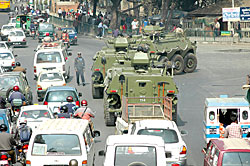That is why despite all the disillusionment since the royal coup, there was a sense of expectation for King Gyanendra's Democracy Day message to the nation last Sunday. After all, the Maoist leaders instead of building on the public relations success of their interview offensive by declaring another ceasefire undid it all by announcing more blockades and a 'decisive final strike' in April.
As it turned out, the royal address was milder and more positive than anything we had heard recently. The word 'democracy' was used 19 times in the 340-word document and the king made what appeared to be a heartfelt appeal to the political parties to negotiate and strengthen 'multiparty democracy'. But, alas, it was too little too late.
If the same speech had been made on Democracy Day last year, it may have worked. The political parties would have been under public pressure to join hands with the king. If it had been made before 1 February, 2005 it would have rendered a royal coup unnecessary. King Gyanendra still has the chance to go into history books as someone who acted in the best interest of his kingdom to restore democracy and peace. One can't exist without the other.
 All he has to say is: "Sovereignty rests with the Nepali people." Is it too much to ask? It would allow the king to sit undisturbed on his throne, hand governance back to an interim setup acceptable to all sides which can prepare for genuine elections and lay the groundwork for a peace process. But if he waits any longer, even this offer will be too late.
All he has to say is: "Sovereignty rests with the Nepali people." Is it too much to ask? It would allow the king to sit undisturbed on his throne, hand governance back to an interim setup acceptable to all sides which can prepare for genuine elections and lay the groundwork for a peace process. But if he waits any longer, even this offer will be too late. A dispassionate analysis of the past year will prove that the royal takeover hurt none more than the monarchy itself. It set off an extraordinary republican wave, pushed the parties over to the Maoist fold, brought Nepal unprecedented international isolation and it even cut the army's lifeline for military hardware.
On a royal retreat in Pokhara, King Gyanendra is said to be contemplating stepping down as chairman and appointing a prime minister. Even if it is who we think it is, this is unlikely to mollify the parties, nor defuse a looming military confrontation with the Maoists.
This Sunday the army will hold its Shivaratri military ritual on Tundikhel and publicly flex its muscles. Who is trying to scare whom with all these guns and cannons?


